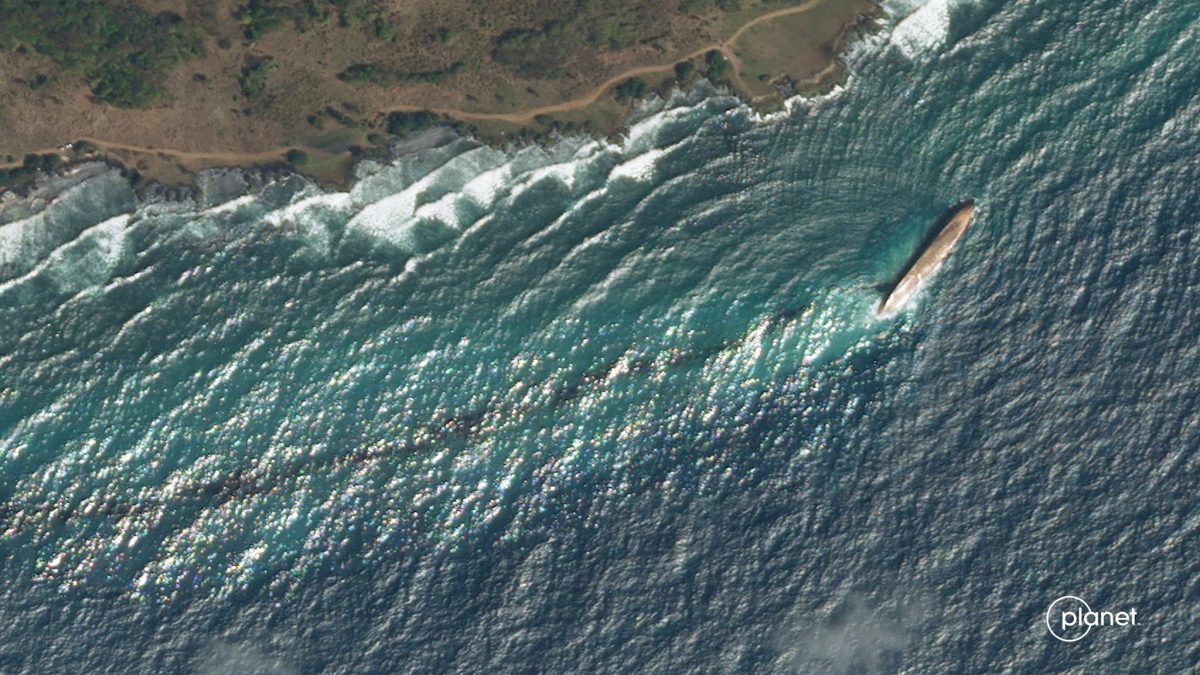(Trinidad Express) The Ministry of Works and Transport is urging the owners of the vessel responsible for spilling more than 50,000 barrels of hydrocarbons along Tobago’s coastline to remove the wrecked craft within one month or else it will be disposed of in accordance with the law.
The appeal from the Works and Transport Ministry came in the form of a public notice regarding the unclaimed wreck at Cove, Tobago, known as Gulfstream.
The notice was attributed to Ronald Alfred, the principal receiver of wreck, of the Maritime Services Division of the Works and Transport Ministry.
“The public is advised that the director Maritime Services Division, in the capacity of Principal Receiver of Wreck, has taken possession of the following vessel that is aground, stranded and abandoned within the waters of Trinidad and Tobago on the South Coast of Tobago at approximately 11° 08.000’ N 60° 47.017’ W at the Cove in Tobago as per Section 331 and Section 334 of the Shipping Act, Chapter 50:10,” the public notice stated.
“The owners of this vessel are advised that if the vessel is not removed within one month of the Public Notice, the vessel may be disposed of under Section 334,” it stated.
Speaking in the Parliament last Friday, Prime Minister Dr Keith Rowley said that on February 7, the Ministry of Energy and Energy Industries was advised by the Trinidad and Tobago Coast Guard that the 200-metre vessel had capsized and was beached on the Tobago coast at Cove.
“And it was observed that a certain amount of what appeared to be a liquid hydrocarbon-based product was escaping from the vessel,” Rowley said.
The Prime Minister said that for over two months, the State-owned Heritage Petroleum Company Ltd had led clean-up operations on Tobago’s coastline.
Rowley said there were also “a few tens of thousands of barrels of dangerous liquid” still in the hull of the vessel.
Asked by Member of Parliament for Couva South Rudranath Indarsingh if the owners of the vessel had been located, Energy Minister Stuart Young, speaking in the Lower House on April 12, said the Government had not been able to identify the owners of the barge and the tugboat involved in the spill.
“That exercise in the confirmation of the owners continues to be pursued by the Ministry of Works and Transport, in particular the Maritime Division, utilising international resources, along with the Ministry of Foreign and Caricom Affairs, which has been writing to the various countries to ascertain and to obtain documentation to support the finding of the ownership of those vessels,” Young said.
Responding to a question in the House of Representatives on March 6, Rowley outlined the steps the Government had undertaken to find the owners of the vessel.
“The Government of Trinidad and Tobago has to ensure a certain degree of accuracy in identifying the owners of the Gulfstream barge and has been using all official channels at its disposal to do so.
“The Government of Trinidad and Tobago, through the Ministry of Foreign and Caricom Affairs, has sent out a number of pneumatic notes to various countries, including Panama, Guyana and Aruba, seeking information with respect to the said vessel and documentation of evidence of ownership,” Rowley said.
“Additionally, the Government, via the Maritime Division, has been using its official network to trace and verify ownership. This has included enquiries of the International Maritime Organisation and the other maritime divisions, including Guyana, Aruba and certain West African countries where the vessels may have been registered.
“The Government is also seeking assistance from foreign and regional agencies in tracking the ownership of the vessel. The Maritime Division has also engaged a private satellite company to assist in satellite imagery of where the vessel originated and travelled from on its journey before the vessel tragically ended up on a reef in Tobago.
“To date, whilst there have been documents and information that indicate connections with the vessel, the confirmation of ownership has so far not been had to the satisfaction of the Government.
“If legal action has to be taken, the Government must be satisfied that we have pertinent and credible information as to who the perpetrators are and where liability lies. That exercise continues,” he said.
In the public notice, Alfred reminded the public that in accordance with Section 338 of the Shipping Act, they could be fined if they board the vessel.
“A person shall not, without the leave of the owner or master, board any vessel which is wrecked, stranded or in distress unless that person is authorised by a receiver, and where a person contravenes this section he is guilty of an offence and is liable to a fine,” the notice stated.
According to Section 338 of the Shipping Act, the fine is $1,000.

